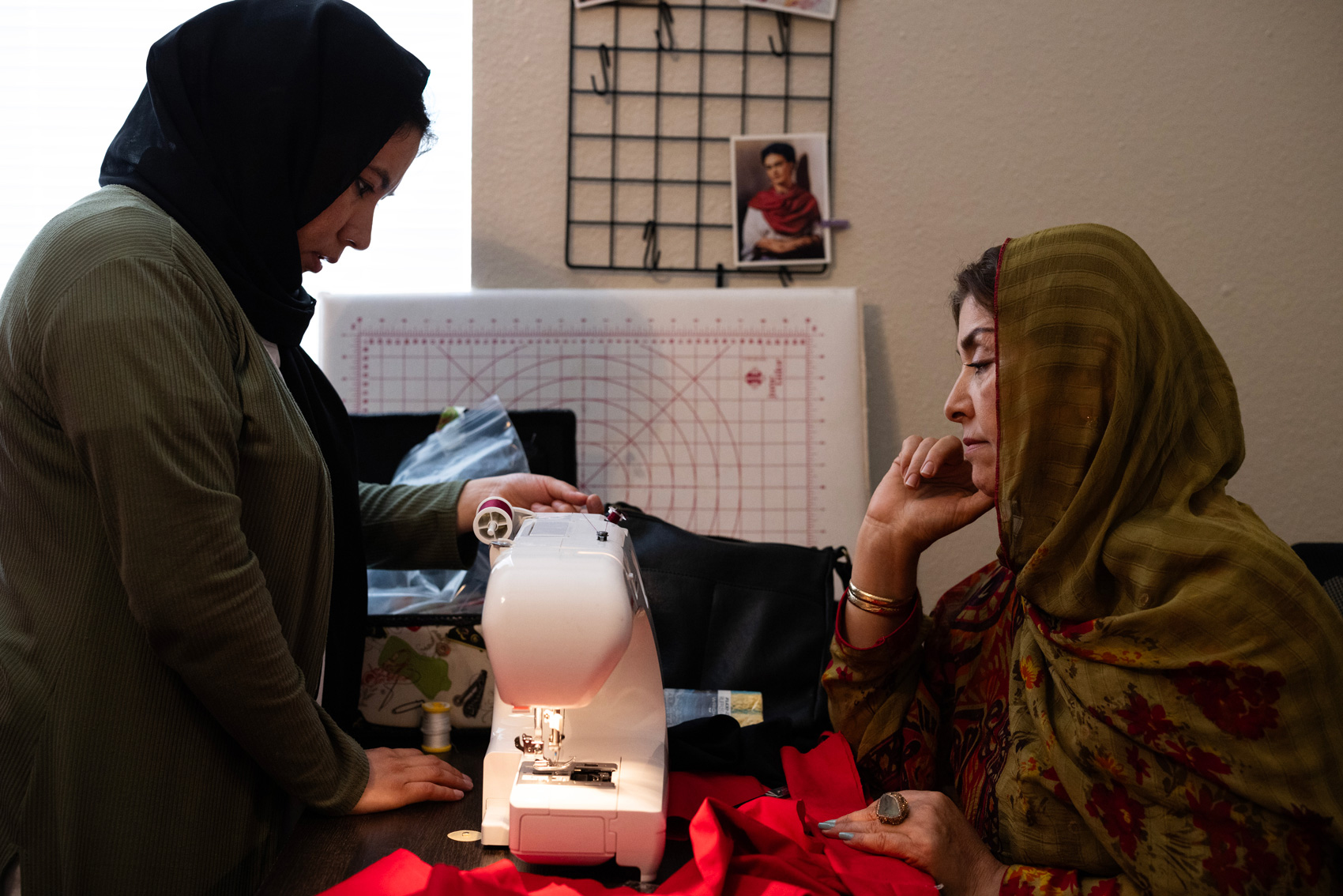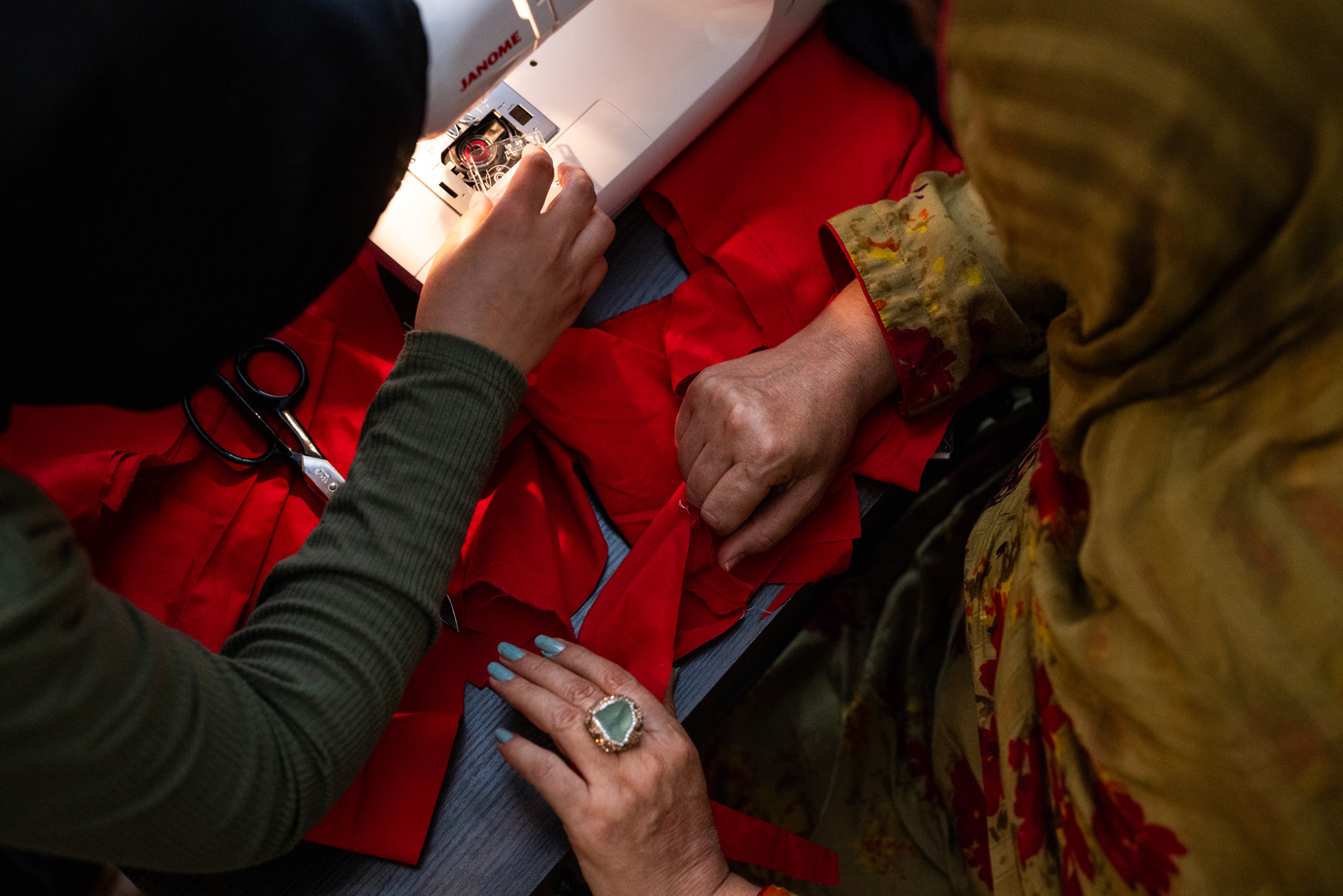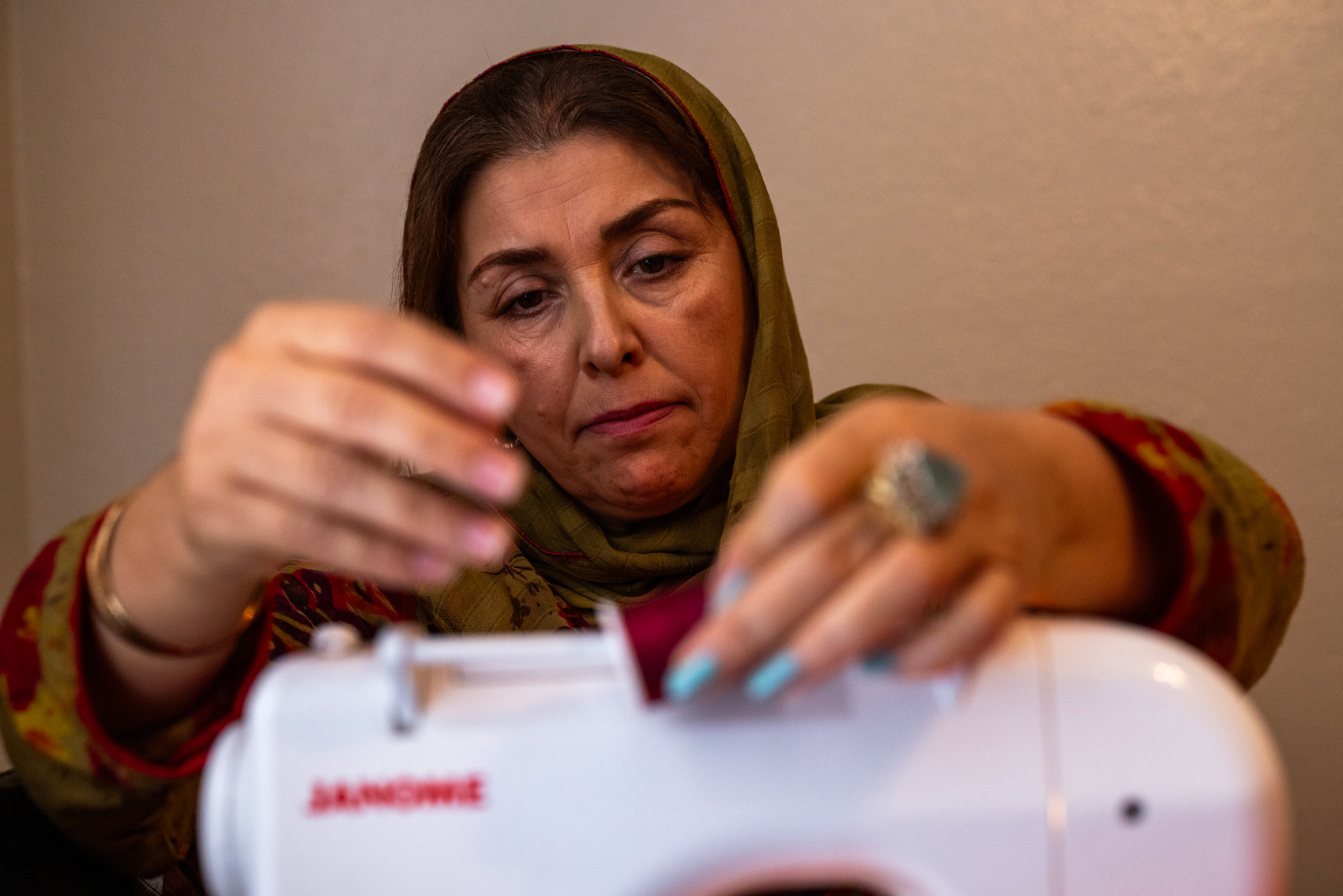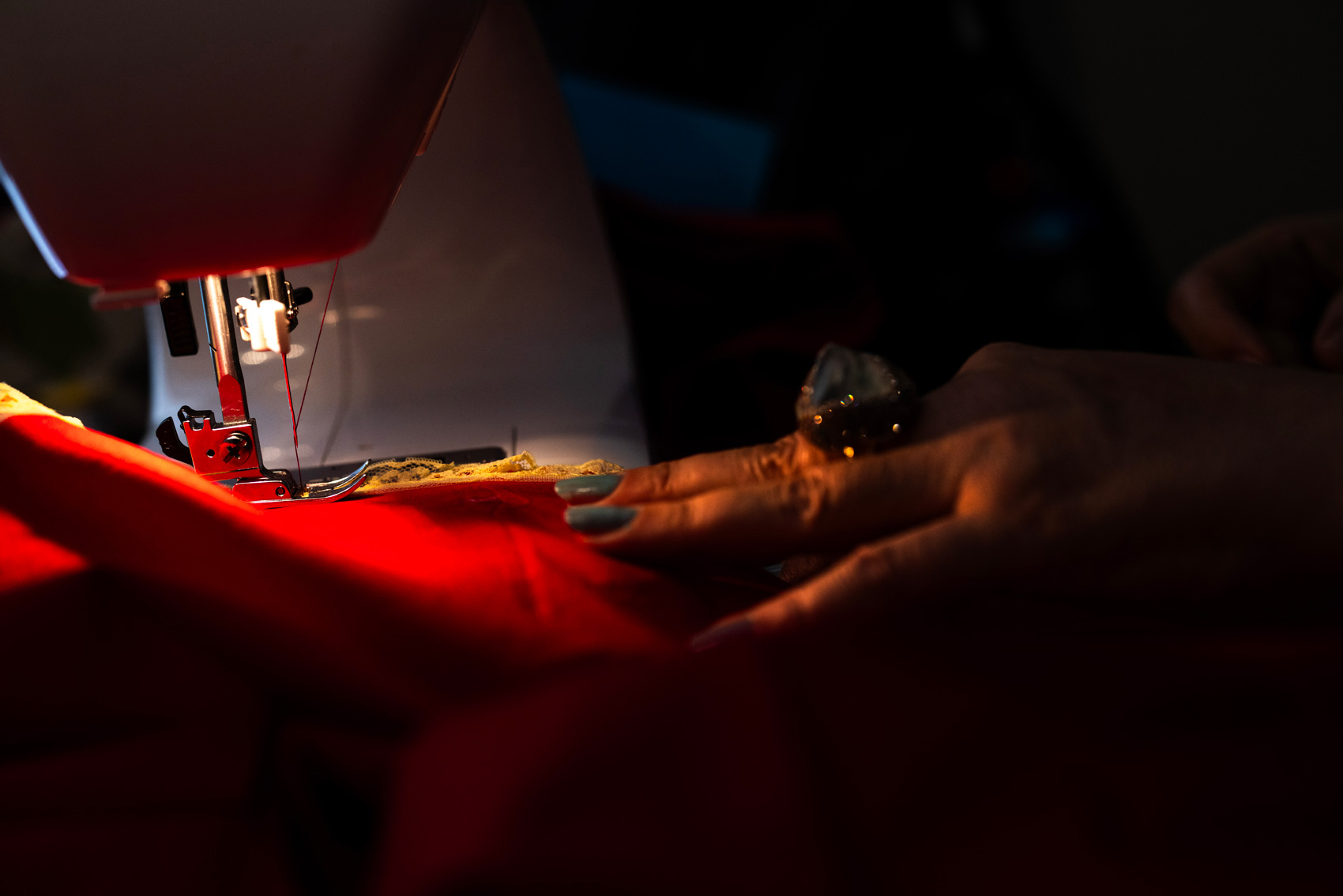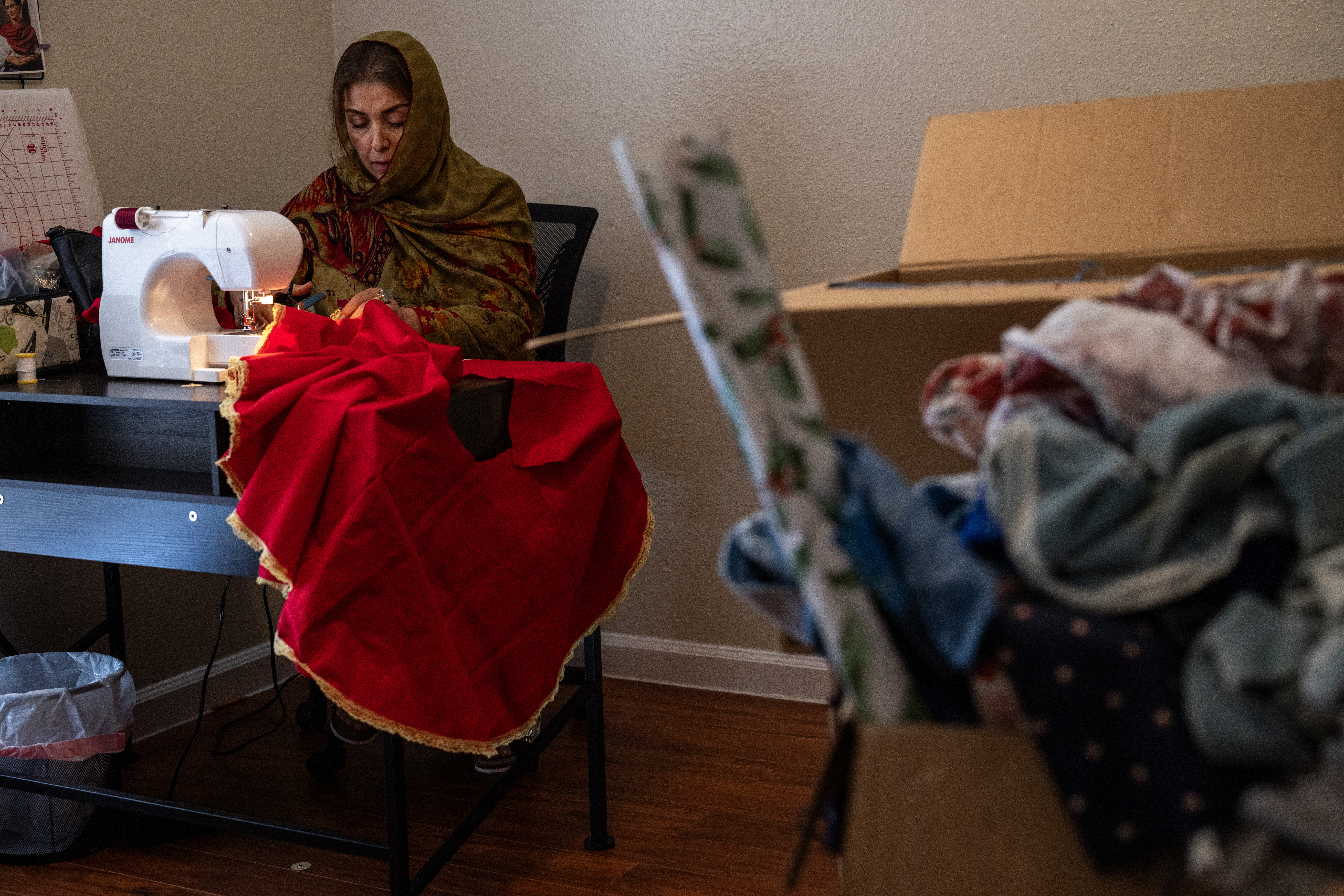|
Getting your Trinity Audio player ready...
|
A small, three-bedroom apartment on the north side of Gulfton buzzes with the sound of nearly a dozen sewing machines going off at different times and speeds. About 20 Afghan women sit around a large rectangular table sharing tips, fabric, laughs and snacks while some of their children play in an adjacent room.
Most of these women are new to the U.S. and landed in the Gulfton neighborhood, known as Houston’s Ellis Island, a place where new Houstonians find connections. They were forced to flee their homes, fearing death and persecution, as the U.S. withdrew its troops from Afghanistan and the Taliban took back control of the country in 2021.
Integrating into a new community comes with additional challenges and trauma, starting with language and cultural barriers. Yet something as simple as a sewing class has become a popular way to help newcomers connect with their immediate community, and with Houston at large. Those connections in turn help them navigate a new life in the U.S.
“I really enjoy to help other people,” said Robaba Hussaini, an instructor at the sewing class. “Especially for those ladies that don’t know how to talk in English.”
Hussaini, 31, hopped from machine to machine teaching the women how to sew a specific part of the child’s dress they were close to finishing. They picked their fabric, matching buttons, and chose lining and decorative frill.
Along the way, they learned to adjust to a new life in America.
6,000 new Houstonians
Since 2021, when the Taliban entered Afghanistan’s capital city of Kabul, Texas has received a large portion of the Afghan parolees and refugees. Texas led nationwide resettlement efforts, receiving more than 10,500 Afghan evacuees as of early 2022, according to a report published by Rice University’s Baker Institute for Public Policy.
Houston alone has received approximately 6,000 immigrants from Afghanistan through resettlement programs since 2021, said Dario Lipovac, refugee services director at Interfaith Ministries for Greater Houston. The organization has helped resettle 1,862 Afghan people since 2021, of which 1,395 came through the U.S.’s Humanitarian Parole program during the evacuation; the rest entered as refugees.
Hussaini resettled to Houston in 2019. She started sewing about a year ago through a class at the local nonprofit organization Connect Community, and she stayed as an instructor and class coordinator. She enjoyed creating something out of nothing, she said, but her main drive is connecting to others.
Like her, many of the women who cycle in and out of classes at the nonprofit arrived in Houston as part of resettlement efforts. And the at-home lessons she helps lead are provided via a partnership between the YMCA International Services and Connect Community.
Hussaini’s mother tongue is Dari, and she is fluent in Pashto, the two official languages of her native Afghanistan. She also learned Urdu and English when she moved to Pakistan as a child. These are all languages that she never imagined using in her first job in the U.S., until she arrived at the textile lab.
Hussaini’s husband is the reason they were able to get a special immigrant visa, due to his work as a translator with the U.S. military in Pakistan. He also encouraged her to take the job, and she now sees how her presence impacts other women.
“In our culture, most of the men or families, they don’t like to see their ladies go outside to work,” Hussaini said. “When the Afghan ladies come in here, they are seeing me… I am putting [on] my scarf, I have a hijab, and I am working, and it’s a safe place.”
Finding space to grow
Currently located inside St. Luke’s United Methodist Church, Connect Community began in the Gulfton area in 2016 with a mission to act as what the organization refers to as a “community quarterback”: a connection between the community and career, housing, and wellness opportunities for each of its members.
“One of the values of Connect is really building strong neighborhood leadership and really getting to know the residents,” said Lauren Caldarera, director of economic vitality initiatives with Connect Community.
When the coronavirus pandemic hit, organizers saw an opportunity in the sudden need for face masks – a potential income source for someone who knows how to sew.
“We had sort of already been mulling on this idea around a textile-something, because … in this neighborhood, there’s tons of different material shops,” Caldarera said. “There’s still a lot of people who still have sewing skills, it’s still not a lost art yet for this population.”
The organization got sewing machines, some of which were donated, into people’s homes and began doing lessons virtually in different languages. Together they produced about 75,000 cloth face masks, which were sold locally and nationally through Etsy.
But as quickly as this need arose, it began to dwindle as the pandemic subsided. However, women kept reaching out about the class, Caldarera said. “We had all these women, predominantly women who were [skilled], and for the first time they were the primary earners in their family and they're like, ‘We don’t want to stop sewing! This allows us to still be home with our kids. It allows us flexibility that we can’t find in a typical 9 to 5 job.’”
The organization launched its own line of pickleball skirts and began attracting “white label” clients, which are typically local brands looking for local manufacturers for their own designs and materials.
The new white-label production brought up the need for consistency and better training, which in turn brought up the need for a “textile lab,” a class where women – as it has organically attracted mostly female participants – can learn industrial sewing from teachers using licensed curriculum, before transitioning into the production portion of the program where they can get paid.
Knowledge of the textile lab mostly spread via word of mouth. The success of the program (classes are often wait-listed) led to the launch of a capital campaign to build a 9,000 square foot textile lab and entrepreneurship center right beneath a 77-unit apartment complex. The new building, located at the intersection of Hillcroft Avenue and High Star Drive, is expected to be completed by the end of 2024.
“Now we kind of have this nice pipeline of, like, people who come through our training. And then they can work with us until they feel like they have the confidence to go out and get a job, and [we] have a network of employer partners who are always willing to hire,” Caldarera said.
Women’s empowerment
Due to its location, Connect Community’s immediate impact affects many recently-arrived immigrants. Although the organization and others serving this community also provide resources for men and children, it is the recently-arrived women who have made the female-only courses so popular.
Hussaini was first hired at Connect Community as a part-time translator in June 2022. Later that year she began taking sewing classes, and eventually became one of the coordinators of the sewing class and the production lab.
“Besides the classes we have in here, if they need me outside of this center, if they need help, I can translate it there,” Hussaini said. “When I am doing that, I really feel happy and like, ‘Oh, this is a good thing that I did for one person.’”
There’s more than sewing classes available to help newcomers. At Interfaith Ministries, the flagship program is a women’s empowerment group that started a couple of years ago with an Arabic-speaking women’s group, and has now expanded to include Dari and Pashto groups.
“Community building among themselves and also with the larger Houston community… that’s one of the main tenets of the women’s empowerment group,” said Praveena Lakshmanan, Interfaith Ministries’ community engagement program manager.
The second component, Lakshmanan said, is education and awareness about day-to-day things that are foreign to them, such as receiving junk mail. And the third is health and wellness, which largely focuses on hygiene, domestic violence, depression and other issues.
“Small things that we often take for granted in day-to-day living is a deep learning curve for many of the women,” she said. “We partner with different community members in Houston to do programming activities.” Some of these partners include the YMCA of Greater Houston, which offers swim lessons, and Ride with Refugees, which provides bike lessons.
“If you empower and educate the women, you empower the family in many different ways,” Lakshmanan said.
Throughout the Abdelraoufsinno’s interviews during the at-home sewing session, YMCA Peer Facilitator Elaha Dellawer translated for most of these women from Pashto and Dari to English. She said it’s important to understand that the women share similar cultural backgrounds but come with unique experiences, skill sets and needs.
Some arrived to the U.S. with their husbands and families. Others arrived alone, fleeing persecution for their roles fighting and advocating for human rights, Dellawer said. But at the end of the day, they all need space to connect with each other and the community at large.
Naheed Sedeqi, 30, moved to the U.S. with her family about a year ago and found an at-home sewing class through the YMCA. If not for this class, she said she would be at home all day taking care of her four children.
“It’s kind of easier for her now, because she’s got a really good husband. He’s also found new friends here, and she says it’s much easier for her now,” Dellawer said as she translated for Sedeqi. “She says now she has to learn [the] English language and driving, and once she learns, she will be stress-free.”
The goal of these networks of aid for refugees is to help them not only survive in a new country, but thrive, said Lipovac, of Interfaith Ministries. At first, this might happen through community aid, but with time they hope this support is useful but not needed.
“‘Self-sufficiency’ is the magic word that we use,” Lipovac said. ““People come to live in the community, they don’t come to live at Interfaith Ministries or the Y.”
Hola! My name is Danya Pérez, one of Abdelraoufsinno’s diverse communities reporters. I cover Latino/Hispanic communities here, including those who are mixed race or mixed status. ¡También soy México-Americana y hablo español! ¿Qué notas te gustaría leer? What topics or stories would you like to see me cover? Email me your ideas at [email protected]


